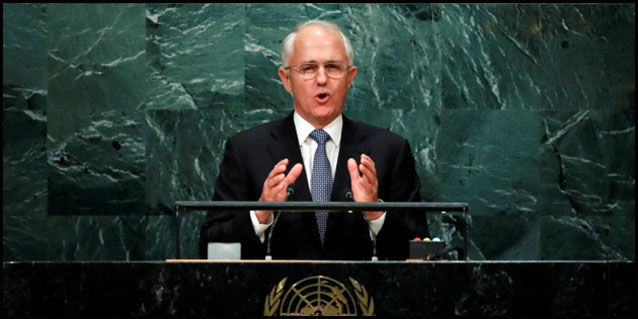735 Malcolm Turnbull and the Politics of Fear
Yesterday a positive view of Malcolm Turnbull, today back to reality: He very much enjoyed his performance at the UN, but not all was good. The fact that he lectured the world about how to best keep the refugee riff-raff away from their borders, was ludicrously inept ... an insult to countries who are not surrounded by hundreds of miles of ocean that Australia has good control over, but who have to contend with thousands of asylum seekers arriving at their inland borders, where it is quite impossible to turn them back.
In the tradition of John Howard's policies at the time, Turnbull is unashamedly trading on fear; the Huffpost has more:

The Huffington Post, Australia (Blog by Anne Aly- Member for Cowan; excerpt):
At the United Nations in New York, Turnbull defended Australia's policies to other world leaders. Mr Turnbull argued that our strict border control policies were necessary to manage public concerns and develop public confidence in the migration program.
Immigration and Border Protection Minister Dutton also defended the policies, stating that: "These policies and practices were not developed from a basis of fear".
Contrary to these claims, Australia's immigration and border control policies were not developed in a climate of public confidence and support. Instead, the success of John Howard's hard line reconfiguration of Australian immigration rested on a deliberately executed campaign of fear.
So let's re-visit history.
In his 2001 election campaign launch speech, former Prime Minister John Howard declared "we will decide who comes to this country and the circumstances in which they come" and in 2001, the Liberal party, led by John Howard, rode to victory on a wave of fear and insecurity.
The politics of fear is an affront to democracy and we must not allow it to become a normalised part of our political process. Public confidence should rely on bringing communities into the decision making process through consultation.